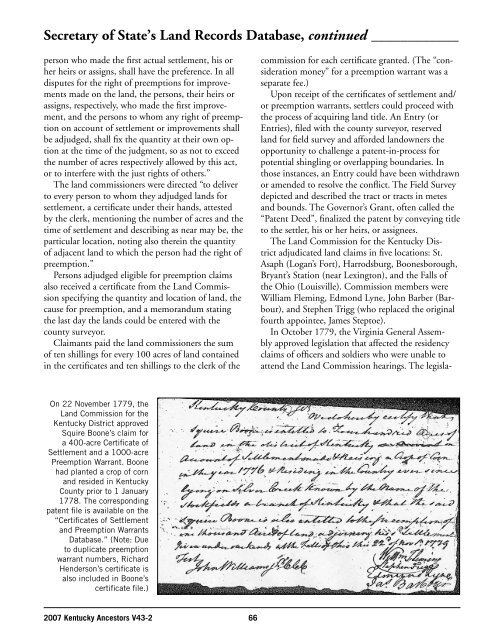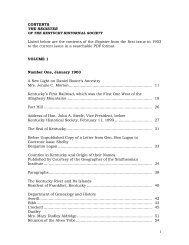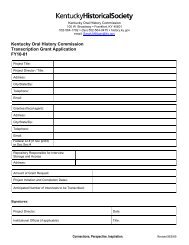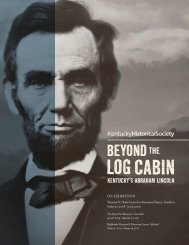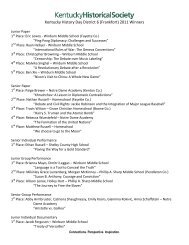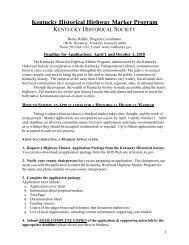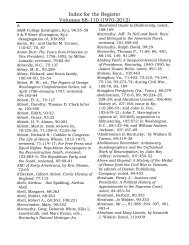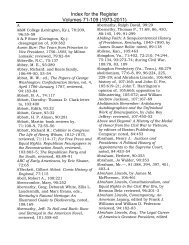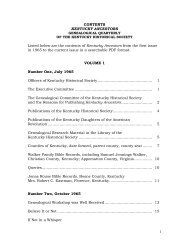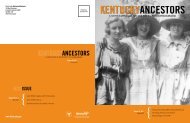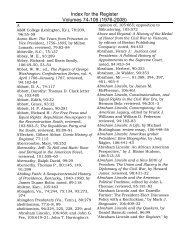Kentucky Ancestors - Kentucky Historical Society
Kentucky Ancestors - Kentucky Historical Society
Kentucky Ancestors - Kentucky Historical Society
You also want an ePaper? Increase the reach of your titles
YUMPU automatically turns print PDFs into web optimized ePapers that Google loves.
Secretary of State’s Land Records Database, continued ____________<br />
person who made the first actual settlement, his or<br />
her heirs or assigns, shall have the preference. In all<br />
disputes for the right of preemptions for improvements<br />
made on the land, the persons, their heirs or<br />
assigns, respectively, who made the first improvement,<br />
and the persons to whom any right of preemption<br />
on account of settlement or improvements shall<br />
be adjudged, shall fix the quantity at their own option<br />
at the time of the judgment, so as not to exceed<br />
the number of acres respectively allowed by this act,<br />
or to interfere with the just rights of others.”<br />
The land commissioners were directed “to deliver<br />
to every person to whom they adjudged lands for<br />
settlement, a certificate under their hands, attested<br />
by the clerk, mentioning the number of acres and the<br />
time of settlement and describing as near may be, the<br />
particular location, noting also therein the quantity<br />
of adjacent land to which the person had the right of<br />
preemption.”<br />
Persons adjudged eligible for preemption claims<br />
also received a certificate from the Land Commission<br />
specifying the quantity and location of land, the<br />
cause for preemption, and a memorandum stating<br />
the last day the lands could be entered with the<br />
county surveyor.<br />
Claimants paid the land commissioners the sum<br />
of ten shillings for every 100 acres of land contained<br />
in the certificates and ten shillings to the clerk of the<br />
On 22 November 1779, the<br />
Land Commission for the<br />
<strong>Kentucky</strong> District approved<br />
Squire Boone’s claim for<br />
a 400-acre Certificate of<br />
Settlement and a 1000-acre<br />
Preemption Warrant. Boone<br />
had planted a crop of corn<br />
and resided in <strong>Kentucky</strong><br />
County prior to 1 January<br />
1778. The corresponding<br />
patent file is available on the<br />
“Certificates of Settlement<br />
and Preemption Warrants<br />
Database.” (Note: Due<br />
to duplicate preemption<br />
warrant numbers, Richard<br />
Henderson’s certificate is<br />
also included in Boone’s<br />
certificate file.)<br />
2007 <strong>Kentucky</strong> <strong>Ancestors</strong> V43-2 66<br />
commission for each certificate granted. (The “consideration<br />
money” for a preemption warrant was a<br />
separate fee.)<br />
Upon receipt of the certificates of settlement and/<br />
or preemption warrants, settlers could proceed with<br />
the process of acquiring land title. An Entry (or<br />
Entries), filed with the county surveyor, reserved<br />
land for field survey and afforded landowners the<br />
opportunity to challenge a patent-in-process for<br />
potential shingling or overlapping boundaries. In<br />
those instances, an Entry could have been withdrawn<br />
or amended to resolve the conflict. The Field Survey<br />
depicted and described the tract or tracts in metes<br />
and bounds. The Governor’s Grant, often called the<br />
“Patent Deed”, finalized the patent by conveying title<br />
to the settler, his or her heirs, or assignees.<br />
The Land Commission for the <strong>Kentucky</strong> District<br />
adjudicated land claims in five locations: St.<br />
Asaph (Logan’s Fort), Harrodsburg, Boonesborough,<br />
Bryant’s Station (near Lexington), and the Falls of<br />
the Ohio (Louisville). Commission members were<br />
William Fleming, Edmond Lyne, John Barber (Barbour),<br />
and Stephen Trigg (who replaced the original<br />
fourth appointee, James Steptoe).<br />
In October 1779, the Virginia General Assembly<br />
approved legislation that affected the residency<br />
claims of officers and soldiers who were unable to<br />
attend the Land Commission hearings. The legisla-


